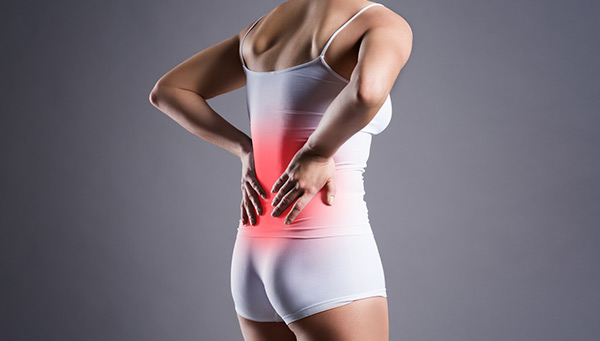5 reasons you're waking up with back pain
Lower back pain can be difficult to manage; whether you have an active job or find yourself sitting at a desk all day, it can be uncomfortable and even debilitating if you can’t perform certain actions without trouble. If your lower back pain is bad in the morning but eases throughout the day, it could be your kidneys suffering – not your muscles.
Many people are unaware of where their kidneys are. The kidneys sit either side of your spine, just below your ribs. Often, those suffering with kidney pain will put it down to a sore back, when really they should be taking care of their kidneys and making sure they are well hydrated.

Unhappy kidneys can cause a lot of pain. If you don’t make sure to stay hydrated then your kidneys will suffer, as their main role is to filter the blood and excrete waste products through urine. Without sufficient water, waste products won’t be eliminated as effectively and various healthy issues can arise, such as recurrent urinary tract infections.
My Top Tip: Solidago Complex is a traditional herbal remedy which has been used for centuries to promote the healthy function of the kidneys to excrete toxins and maintain mineral balance. Take 10-15 drops in a little water, 3 times daily. Solidago Complex is a traditional herbal remedy which has been used for centuries to promote the healthy function of the kidneys to excrete toxins and maintain mineral balance. Take 10-15 drops in a little water, 3 times daily.
|
1. You're not drinking enough water
This leads me to my first point: not drinking enough water is the most obvious cause of dehydration and, thus, painful kidneys. If we’re getting the full 8 hours of sleep every night, obviously our bodies will become dehydrated. This long interval between drinking might be even longer if you avoid drinking too close to bedtime because you worry about needing the loo during the night.
So, it’s important to rehydrate your body as soon as you wake up in the morning. However, water isn’t usually the first thing on our minds when we wake up on a dark Monday morning with a full week of work ahead. A strong coffee or tea is usually our first point of call! This means that your kidneys could be suffering for a long time if you don’t think about drinking water until later on in the morning, or even lunch time.
Your lower back pain might be bad enough on an average weekday morning, but a long lie on the weekend can exacerbate the issue even more, as your body is waiting even longer for that precious liquid. Plus, alcohol consumed the night before won’t help matters, as this will increase the rate at which you pee while drinking, and can leave you even more dehydrated the next morning.
Top tip: Take a large glass of water to bed with you at night. If you wake up thirsty during the night, you can sip on some water to quench your thirst, rather than having to find your way to the kitchen. Plus, if you don’t wake up to drink during the night, you’ll have a glass of water by your bed ready to drink as soon as you wake up! Not only will this help to rehydrate your body and ease your back pain, it will also help you to wake up and feel ready to take on the day.
2. You're eating too much salt
Your kidneys can also suffer if your electrolytes are out of balance. Sodium and potassium are constantly in competition with each other, and if you are consuming too much salt then these minerals will be out of kilter. As we know, our kidneys are responsible for maintaining a balance between electrolytes, so are forced to work extra hard if you have too much salt in your diet.
Unfortunately, it’s all too easy to have a high salt diet these days, as processed and packaged foods are in abundance; while fresh vegetables and fruits are found on fewer and fewer plates. Your kidneys can easily become overwhelmed by too much salt, and your cells can become swollen as they absorb water to try to dilute the high salt levels in your body. As a result, your body can become dehydrated and swollen.
So, although you might be drinking what you think is a sufficient amount of water, if you are consuming too much salt then this can alter your fluid balance and cause achy kidneys. Plus, you may not even be aware that your diet contains more salt than it should! Salt can be found in various supermarket products, not to mention that many of us add even more salt at the dinner table. The recommended daily salt intake for adults is 6g, and we should all make the effort to check the salt content of the foods we’re eating. You might be surprised at how much salt is in your food!

Top tip: Avoid processed meats as these often use high quantities of salt as a preservative. Ready meals and tinned foods also contain a lot of salt, so try to eat fresh where you can. Why not try cooking with fresh, wholefoods ahead of time and freezing individual portions? This will help if you struggle to find enough time to prepare meals, and will ensure that you’re not consuming unnecessary extra salt.
3. You have low levels of potassium
On the other hand, while we tend to consume too much salt in our diets, we also tend to be lacking in potassium, a mineral which helps with fluid balance. What’s more, not only do the kidneys hold onto salt and water, they also release vital potassium when the balance between these minerals isn’t quite right. Therefore, as well as reducing your salt intake, it’s equally as important to up your intake of potassium to avoid overwhelming your kidneys as they struggle to maintain equilibrium.
To help avoid back pain caused by troubled kidneys, you can make sure to incorporate lots of fresh fruit and vegetables into your diet. White and sweet potatoes are both great sources of potassium, as well as bananas, kiwi fruits and oranges.
Top tip: Balance Mineral Drink is a refreshing strawberry drink that contains a sensible dose of potassium, plus other minerals like vitamin D, magnesium and zinc. It can be added to water for a refreshing strawberry drink, or included in your favourite fruit smoothie. Keeping your potassium levels topped up will help to keep your kidneys ticking over, and avoid troubling back pain.
4. You're sweating too much at night
Another reason why you might be waking up in the morning with back pain is sweat. Even if you drink plenty of water during the day, if you sweat a lot during the night then you will become dehydrated. Dehydration, simply put, is when your body loses more water than it gains. If you’re not replenishing your water levels while you sleep, then any water lost during the night will have an effect in the morning.
Women going through menopause often experience night sweats as a symptom of falling oestrogen levels. When oestrogen levels lower, so does the body’s thermostat. As a result, the body thinks it is overheating and starts sweating to cool itself down.
Top tip: Make sure your duvet and pyjamas are not too heavy if you struggle with sweating at night. It may help to keep two duvets – a cosy one for cold winter nights and a lighter one for the rest of the year. Or, keep a light blanket close by if you find the duvet too hot. This means you can keep yourself cool without disturbing your partner’s sleep.
5. Your body is struggling with big evening meals
There are other reasons for sweating during the night besides menopause and a heavy duvet. If you are overweight you may find that you sweat a lot during the night, and as a result wake up dehydrated and achy.
Eating large, stodgy meals in the evening will force your body to work harder to metabolise your foods. On top of this, eating shortly before bed means that your body will be working hard and sweating while you sleep, which once again will leave you dehydrated come morning.
A similar process will take place after drinking alcohol: 6 pints on a Saturday night, for example, will push your body into overdrive and make it work hard while you sleep. Not only does alcohol act as a diuretic and make you pee more during a night out, metabolising excess amounts of alcohol overnight will also put pressure on your system and cause you to sweat.

Top tip: Aim to stop eating a couple of hours before you go to bed, to avoid forcing your body to work overtime to metabolise large amounts of food while you sleep. This will help you to avoid discomfort and sweating during the night, which in turn will ensure that your body isn’t dehydrated come the morning.
When to visit your doctor
There are some red flags to look out for when it comes to taking care of your kidneys. Pain in your lower back when you wake up could be a sign of dehydration, but alongside other symptoms it could be a sign of something more serious. Talk to your doctor if you experience:
- Fever
- Pain while urinating
- Nausea and vomiting
- Stomach pain
- Blood in your urine









